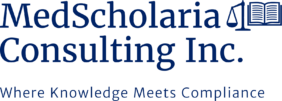
By MedScholaria Consulting Inc. | Continuing Education Series | 2025
Utilization Management (UM) is at a critical crossroads. What was once a gatekeeping mechanism to ensure clinical appropriateness and cost control has, in many cases, evolved into a source of friction—delaying care, frustrating clinicians, and confusing patients. But AI is changing the game—and so are innovative healthcare systems like Highmark Health, which are not only using artificial intelligence, but redefining the entire purpose of UM.
At MedScholaria Consulting Inc., we believe continuing education for UM professionals must do more than explain technology—it must reframe your role in a transforming system.
Here’s how AI, Active Gold Carding, and human oversight are shaping the future of UM in 2025 and beyond.
From Burden to Partnership: AI’s Emerging Role in UM
AI is now embedded in many UM workflows—from auto-generating summaries to triggering guideline-based authorization decisions. Tools based on MCG (Milliman Care Guidelines) or similar evidence sets can instantly evaluate requests for imaging, procedures, or medications. The result? Faster reviews. Less clerical work. And, ideally, better outcomes.
But there’s a catch.
These tools are only as good as the data they can see.
Take, for example, a recent AI-assisted denial scenario involving a patient with congestive heart failure (CHF). The AI flagged a repeat echocardiogram as medically unnecessary—based on MCG’s standard 30-day interval rule. But a social worker intervened, uploading documentation from a home health nurse noting weight gain, rising BNP levels, and missed follow-up due to transportation issues.
Would you override the denial?
This case study, used in MedScholaria’s latest CE module, sparked a rich debate. It highlights the irreplaceable value of human clinical judgment, and the need for AI systems that integrate social determinants of health (SDOH) and off-EHR data sources.
🔑 Gold Carding: Reducing Friction, Elevating Trust
While AI is one side of the equation, policy redesign is the other. At Highmark Health, a bold new model is transforming the way prior authorizations are handled: Gold Carding.
Here’s how it works:
If a provider consistently demonstrates a 99%+ adherence to evidence-based guidelines, they’re “Gold Carded.” This means they no longer need to submit clinical documentation for certain services—just a prenotification, and the service is instantly approved.
As of late 2024, Highmark had:
- Over 21,000 Gold Carded providers
- Reduced prior auth admin time by up to 85%
- Expanded Gold Carding across 14+ modalities, including MRI, CT, ECHO, PET scans, and pain injections
This not only lightens the administrative load—it builds trust with providers and eliminates unnecessary delays for patients.
🧭 Active Gold Carding: Education + AI + Human Support
What if a provider isn’t quite at the 99% threshold?
That’s where Active Gold Carding comes in. Highmark’s approach doesn’t just reward high performers—it guides providers on a path to success. Using real-time claims data, concierge nurses, and direct coaching, Active Gold Carding provides the feedback loop necessary to help clinicians avoid denials and meet performance targets.
This model demonstrates a major shift in UM culture—from punitive to collaborative.
And here’s the kicker: many Active Gold Card participants eventually “graduate” into full Gold Card status, improving patient access and reducing waste system-wide.
🔄 Automation Meets Ethics: Where AI Still Needs You
With CMS advancing FHIR-based prior authorization APIs, and the FDA enforcing oversight for Software as a Medical Device (SaMD), regulatory momentum is on the side of automation. Even the Joint Commission is applying machine learning to increase surveyor consistency and using natural language processing to flag risk areas during accreditation.
Read more here: CMS Final Rule
But none of this eliminates the need for clinical reasoning.
MedScholaria’s training encourages UM professionals to use structured tools like our AI Decision Override Simulation, which helps clinicians practice when—and how—to override AI recommendations based on new evidence, equity concerns, or undocumented patient complexities.
💬 Real-Time Learning: What Would You Do?
We ask our learners:
If AI says deny based on guidelines, but a human adds context from a home health visit, does the clinical picture change?
The right answer? It depends. But the key skill is learning how to bridge what the AI sees with what you know—a core competency in tomorrow’s UM workforce.
📣 Ready to Redefine Utilization Management?
At MedScholaria Consulting Inc., we don’t just talk about the future of UM—we train you for it. Whether you’re a UM nurse, case manager, physician advisor, or medical director, it’s time to move from compliance-focused to transformation-ready.
✨ Explore our newest CE module:
“The Role of Artificial Intelligence in Utilization Management – Enhancing Healthcare Decision-Making”
Lesson Highlight: Redesigning UM through AI, Active Gold Carding, and Human Insight
📄 Includes:
- Case-based simulations
- Interactive override form
- Polling and journaling reflections
- MCG and CMS-aligned best practices
📌 Key Takeaways
- AI tools are streamlining UM, but require strong human oversight
- MCG guidelines should be blended with real-world data, including SDOH
- Gold Carding and Active Gold Carding represent scalable UM redesign
- Providers and payers must collaborate, not compete
- Education and structured feedback are key to safe transformation
